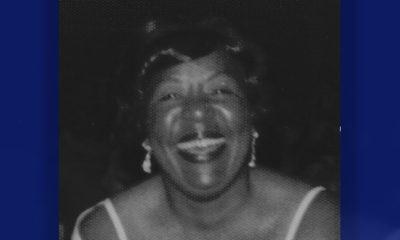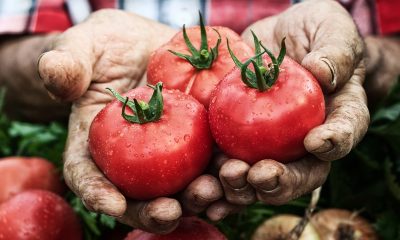Black History
Textiles Tell the Story of the Last Great African Kingdom
THE AFRO —
A collection of unique textiles are on display at the Baltimore Museum of Art (BMA).
“Kuba: Fabric of an Empire” has collected royal garments and display textiles to tell the story of the rise and fall of Africa’s last great pre-colonial kingdom.
The items were either worn by members of the royal court or were gifted to the aristocracy by subjects of the Kuba kingdom.
Many galleries and museums have examples of Kuba textiles in their vaults or on display, but BMA has taken the additional steps of having their collection carbon dated to determine more precise ages for each textile.
“Everyone knew that the Kuba kingdom produced these really spectacular amazing textiles, but they didn’t know how old they were, they didn’t know really anything other than how they were being used right now,” Kevin Tervala, BMA Associate Curator and curator of “Kuba” told the AFRO.
The textiles are woven of fine fibers of raffia palm fronds. The raw material is gathered by Kuba men and a foundational fabric is woven on a loom. Kuba women take over the design phase embroidering the base and applying geometric patches.
A royal skirt is over 25 feet long and wrapped around a royal several times.
The final product has a velvet-like sheen.
All such Kuba textiles are designed to draw in and entrap the eye, Tervala says. Those in the presence of royalty are almost entranced, the eye fixes on the material and thus, the aristocracy.
While all the textiles are unmistakably Kuban, there is nevertheless an obvious change in the practice and theory of design over the centuries.
“What came back was this really amazing change-over-time narrative,” Tervala said of the carbon dating results. “Each one of these different types of textiles sections talks about how these textile designs evolved over the course of the 18th, 19th and the 20th century and
how that evolution was linked with changes in politics brought on by colonialism, by globalized trade, by Congolese independence, and things like that.”
As the outside world crept in and ultimately invaded and conquered a closed kingdom, textile design became one way of adapting or coping.
“The authority of the court is eroded by colonialism,” Tervala said. “The Kuba leaders, as their power declines, they lean into pomp as a way to showcase their authority. The designs get bigger and bolder and more able to be viewed from a distance. That’s something you’re going be able to see from a distance, that’s striking, that’s eye-catching, that has more design elements to hold your attention and draw the viewer in.”
Helping to make the strongest case is a timeline of fabrics showing how designs changed with outside conflict, civil war and finally the sacking of the court by Belgian colonizers.
“What we’re able to do for the first time is tell the history of this kingdom, which has never been done before, anywhere,” Tervala said.
This article originally appeared in The Afro.
Activism
Oakland Post: Week of November 26 – December 2, 2025
The printed Weekly Edition of the Oakland Post: Week of November 26 – December 2, 2025

To enlarge your view of this issue, use the slider, magnifying glass icon or full page icon in the lower right corner of the browser window.
Activism
Oakland Post: Week of November 19 – 25, 2025
The printed Weekly Edition of the Oakland Post: Week of November 19 – 25, 2025

To enlarge your view of this issue, use the slider, magnifying glass icon or full page icon in the lower right corner of the browser window.
Activism
IN MEMORIAM: William ‘Bill’ Patterson, 94
Bill devoted his life to public service and education. In 1971, he became the founding director for the Peralta Community College Foundation, he also became an administrator for Oakland Parks and Recreation overseeing 23 recreation centers, the Oakland Zoo, Children’s Fairyland, Lake Merritt, and the Henry J. Kaiser Convention Center.

William “Bill” Patterson, 94, of Little Rock, Arkansas, passed away peacefully on October 21, 2025, at his home in Oakland, CA. He was born on May 19, 1931, to Marie Childress Patterson and William Benjamin Patterson in Little Rock, Arkansas. He graduated from Dunbar High School and traveled to Oakland, California, in 1948. William Patterson graduated from San Francisco State University, earning both graduate and undergraduate degrees. He married Euradell “Dell” Patterson in 1961. Bill lovingly took care of his wife, Dell, until she died in 2020.
Bill devoted his life to public service and education. In 1971, he became the founding director for the Peralta Community College Foundation, he also became an administrator for Oakland Parks and Recreation overseeing 23 recreation centers, the Oakland Zoo, Children’s Fairyland, Lake Merritt, and the Henry J. Kaiser Convention Center.
He served on the boards of Oakland’s Urban Strategies Council, the Oakland Public Ethics Commission, and the Oakland Workforce Development Board.
He was a three-term president of the Oakland branch of the NAACP.
Bill was initiated in the Gamma Alpha chapter of Kappa Alpha Psi Fraternity.
In 1997 Bill was appointed to the East Bay Utility District Board of Directors. William Patterson was the first African American Board President and served the board for 27 years.
Bill’s impact reached far beyond his various important and impactful positions.
Bill mentored politicians, athletes and young people. Among those he mentored and advised are legends Joe Morgan, Bill Russell, Frank Robinson, Curt Flood, and Lionel Wilson to name a few.
He is survived by his son, William David Patterson, and one sister, Sarah Ann Strickland, and a host of other family members and friends.
A celebration of life service will take place at Henry J. Kaiser Convention Center (Calvin Simmons Theater) on November 21, 2025, at 10 AM.
His services are being livestreamed at: https://www.facebook.com/events/1250167107131991/
In lieu of flowers, donations can be made to the Euradell and William Patterson scholarship fund TBA.

-

 Activism3 weeks ago
Activism3 weeks agoOakland Post: Week of November 12 – 18, 2025
-

 Activism4 weeks ago
Activism4 weeks agoOakland Post: Week of November 5 – 11, 2025
-

 Activism2 weeks ago
Activism2 weeks agoIN MEMORIAM: William ‘Bill’ Patterson, 94
-

 Activism3 weeks ago
Activism3 weeks agoHow Charles R. Drew University Navigated More Than $20 Million in Fed Cuts – Still Prioritizing Students and Community Health
-

 Bay Area3 weeks ago
Bay Area3 weeks agoNo Justice in the Justice System
-

 #NNPA BlackPress3 weeks ago
#NNPA BlackPress3 weeks agoThe Perfumed Hand of Hypocrisy: Trump Hosted Former Terror Suspect While America Condemns a Muslim Mayor
-

 #NNPA BlackPress2 weeks ago
#NNPA BlackPress2 weeks agoTrump’s Death Threat Rhetoric Sends Nation into Crisis
-

 #NNPA BlackPress4 weeks ago
#NNPA BlackPress4 weeks agoProtecting Pedophiles: The GOP’s Warped Crusade Against Its Own Lies























































